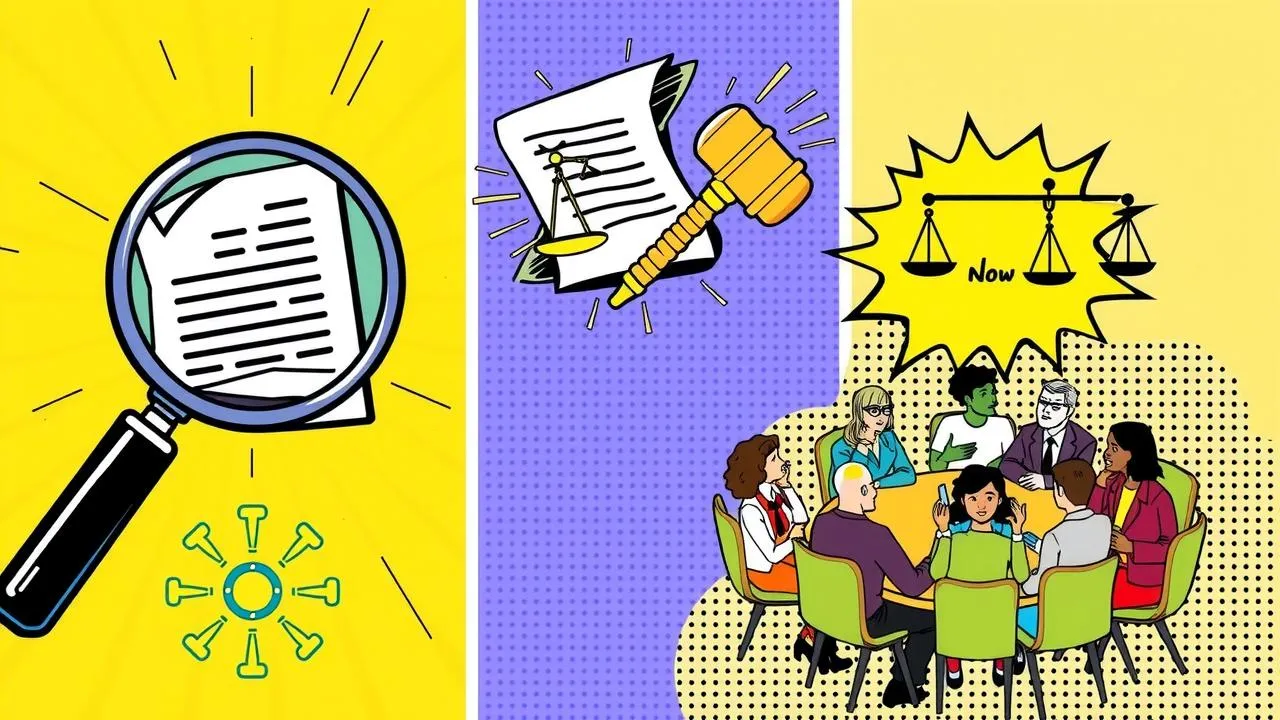Now Reading: Finding the Right Lawyer in 2025: Key Tips to Consider
-
01
Finding the Right Lawyer in 2025: Key Tips to Consider
Finding the Right Lawyer in 2025: Key Tips to Consider

Finding the right lawyer can seem really tough as we move into 2025. The legal world is always changing with new technology and shifting needs. First, it’s important to know what type of lawyer you need for your situation, whether it’s family, criminal, or business law. Using online directories like Avvo can help you find lawyers based on reviews and specialties. Don’t forget to ask friends or family for their recommendations too! When meeting potential lawyers, be sure to ask about their experience and fees during consultations. Finally, trust your gut feeling; a good connection can make a big difference in your case’s success.
1. Understand Your Legal Needs

To find the right lawyer, start by identifying your legal needs. This involves determining the specific area of law that pertains to your situation. For example, if you are dealing with a divorce or child custody issues, you will need a family law attorney. If you are facing criminal charges, a criminal defense lawyer is essential. It’s also important to clarify the nature of your case. Is it transactional, like drafting a will or contract, or is it litigation-based, such as filing a lawsuit? Understanding these aspects will help you narrow down your search and find a lawyer with the right expertise for your case.
2. Utilize Technology for Your Search
In 2025, technology plays a crucial role in finding the right lawyer. Start by exploring online legal directories like Avvo, Justia, or LegalMatch. These platforms allow you to search for lawyers based on their areas of expertise and read client reviews that can guide your decision. Additionally, consider checking out lawyers’ social media profiles on platforms like LinkedIn or Twitter. These profiles often showcase their experience, insights, and even their personality, giving you a better sense of whether they might be a good fit for you. For example, a lawyer who actively shares articles related to your legal issue may demonstrate both knowledge and commitment to staying updated in their field. Using these tools effectively can streamline your search and help you make an informed choice.
3. Leverage Personal Recommendations
When searching for the right lawyer, personal recommendations can be invaluable. Start by asking friends, family, or colleagues if they know any lawyers who have provided them with excellent service. Their firsthand experiences can help you narrow down your options and find someone trustworthy.
Additionally, consider networking within your community. Attend local legal seminars, workshops, or even general community events where lawyers might be present. This not only allows you to meet potential lawyers face-to-face but also gives you a chance to gauge their expertise and approach in a more informal setting. For instance, if you hear a lawyer speak at a community event and resonate with their values or communication style, it could influence your decision to reach out for assistance.
4. Research Potential Lawyers Thoroughly
Researching potential lawyers is a crucial step in finding the right legal representation. Start by checking their qualifications, which includes verifying their educational background, professional licenses, and any certifications they may hold. This ensures that they are legally permitted to practice in your state and have the necessary expertise.
Reading reviews and testimonials from past clients can provide valuable insights into a lawyer’s reliability and effectiveness. Websites like Avvo or Google Reviews can offer a glimpse into their reputation, helping you gauge whether they are a good fit for your needs. Look for patterns in feedback—consistent positive reviews about communication or case outcomes can indicate a strong candidate.
Additionally, consider exploring their online presence. Many lawyers maintain websites that outline their specialties, case studies, and client success stories. A well-crafted website can reflect a lawyer’s professionalism and commitment to their practice.
Don’t hesitate to dig deeper into their legal history. Inquire about their experience with cases similar to yours. A lawyer who has successfully handled cases like yours might have a better understanding of the nuances involved and can navigate the legal process more effectively.
Also, check if they are affiliated with any professional organizations, which can be a sign of their dedication to ongoing education and adherence to ethical standards. A lawyer who actively participates in legal discussions and continues to learn about their field is likely to be more informed about current laws and practices.
By thoroughly researching potential lawyers, you increase your chances of finding someone who not only meets your legal needs but can also provide you with the support and guidance you require throughout your case.
- Check online reviews and ratings on legal directories
- Visit their official website for credentials and practice areas
- Review their case history and outcomes
- Verify their standing with the state bar association
- Look for any disciplinary actions or malpractice claims
- Assess their communication style through emails or calls
- Compare rates and fee structures to find a fit
5. Schedule Initial Consultations with Lawyers
Scheduling initial consultations with potential lawyers is a crucial step in finding the right legal representation. Many lawyers offer free consultations, which provide an excellent opportunity to gauge their compatibility with your needs. During these meetings, it’s essential to come prepared with a list of questions that can help you understand their experience and approach. For instance, ask about their fees and payment structures, their experience with cases similar to yours, and how they plan to communicate with you throughout the process. This exchange of information will also allow you to assess their communication style and responsiveness. Pay attention to how they address your concerns and whether they make you feel comfortable discussing sensitive issues. Remember, the initial consultation is not just about evaluating the lawyer’s qualifications, but also about determining if you can establish a trusting relationship that will be vital as your case progresses.
6. Evaluate Communication Style with Potential Lawyers
When choosing a lawyer, evaluating their communication style is essential. Start by observing how responsive they are during your initial interactions. If a lawyer promptly answers your emails or calls, it often indicates they value communication and are committed to keeping you informed throughout your case.
Moreover, consider your comfort level when discussing personal and sensitive issues with them. You should feel at ease sharing details about your situation, as trust is a fundamental element of the attorney-client relationship. For example, if you have a family law issue, being able to openly discuss your concerns about custody or divorce is vital.
Additionally, pay attention to how clearly the lawyer explains legal concepts. They should be able to break down complex legal jargon into understandable terms, helping you feel more secure in your understanding of the process. Lastly, ensure that their communication style aligns with your preferences. If you prefer regular updates via email, make sure they are willing to accommodate that. Finding a lawyer whose communication style resonates with you can make a significant difference in your overall experience.
7. Consider Experience and Track Record
When searching for a lawyer, it’s crucial to consider their level of experience and track record. Start by asking about their case history. A lawyer who has successfully handled cases similar to yours can provide insights and strategies that are tailored to your specific situation. For example, if you are facing a complex divorce, a lawyer with a strong history of navigating high-asset cases will likely understand the nuances involved and can better advocate for your interests.
Additionally, you should check if the lawyer has any professional affiliations. Membership in organizations like the American Bar Association often signifies a commitment to ongoing education and ethical standards. This can be a good indicator of their dedication to staying updated on legal changes and best practices.
Don’t hesitate to ask for references from past clients. A reputable lawyer should be able to provide testimonials or connect you with previous clients who can share their experiences. This firsthand feedback can give you a clearer picture of what to expect and help you gauge the lawyer’s effectiveness.
8. Assess Costs and Fee Structures
Understanding the costs and fee structures associated with hiring a lawyer is crucial to avoid unexpected financial burdens. Start by asking about their fee arrangements. Some lawyers charge by the hour, while others may offer flat fees for specific services or work on a contingency basis, particularly in personal injury cases where they only get paid if you win. It’s essential to clarify these details early on to understand how you will be billed. Additionally, be aware of any extra costs that might arise during your case. For instance, court fees, filing fees, and expenses for expert witnesses can add up quickly. Request a detailed breakdown of potential costs to get a complete picture of your financial commitment. This way, you can make an informed decision and choose a lawyer whose fees fit your budget.
| Fee Arrangement Type | Description | Considerations |
|---|---|---|
| Hourly Rate | Charged per hour of work | May lead to high costs for complex cases. |
| Flat Fee | Set price for specific legal services | Good for predictable legal work. |
| Contingency Fee | Lawyer is paid a percentage of the settlement or court award | Common in personal injury cases; no payment if no recovery. |
| Retainer Fee | Upfront fee paid to secure services | May require additional payments as work is completed. |
9. Trust Your Gut Instincts
When it comes to finding the right lawyer, your intuition can be a powerful guide. After meeting with potential lawyers, pay attention to how you feel about each one. If something feels off or if you don’t connect with a lawyer during your consultation, it might be best to continue your search. For example, if a lawyer seems overly aggressive or dismissive of your concerns, it could indicate a lack of empathy that might affect your case. Conversely, if you find a lawyer who listens attentively and makes you feel comfortable, that’s often a good sign. Trusting your gut can help you choose someone who will represent your interests effectively and make the legal process less stressful.
10. Stay Informed About Legal Trends in 2025
Staying informed about legal trends in 2025 is crucial for anyone seeking legal assistance. Laws are constantly changing, influenced by technology, social movements, and new legislation. For instance, the rise of artificial intelligence in legal practices may lead to changes in how cases are managed and represented. Understanding these trends can help you have more meaningful discussions with potential lawyers. It allows you to ask informed questions, such as how they plan to leverage new technologies in your case or how recent changes in the law may impact your situation. Additionally, being aware of shifts in public policy or emerging areas of law, like data privacy or environmental regulations, can guide you in selecting a lawyer who is not only knowledgeable but also adaptable to the evolving legal landscape.
Frequently Asked Questions
1. What should I look for in a lawyer’s experience?
When choosing a lawyer, it’s important to check how long they have been practicing and if they have handled cases similar to yours before.
2. How can I tell if a lawyer is a good communicator?
You can find out about a lawyer’s communication skills by seeing how quickly they respond to your calls or emails and how clearly they explain things to you.
3. What does a lawyer’s specialization mean for my case?
A lawyer’s specialization means they focus on a specific area of law, like family, criminal, or business law, and this can greatly influence how well they can handle your case.
4. Why is it important to check a lawyer’s reputation?
A lawyer’s reputation can tell you a lot about their reliability and effectiveness, so it’s good to read reviews or ask for referrals from people you trust.
5. How do I know if I will feel comfortable working with a lawyer?
It’s important to meet with the lawyer in person or have a phone consultation. Pay attention to how you feel during the conversation and if you feel they understand your needs.
TL;DR Finding the right lawyer in 2025 requires understanding your legal needs, utilizing technology for your search, and leveraging personal recommendations. Research potential lawyers thoroughly, schedule initial consultations, and evaluate their communication style. Consider their experience, costs, and fee structures, and trust your instincts. Stay informed about legal trends to make an informed choice.












